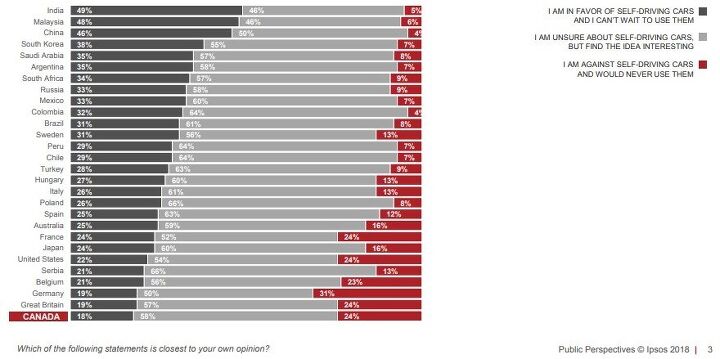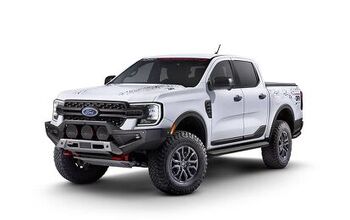QOTD: Are These Crazy Canucks Onto Something?

A great number of us here at TTAC distrust autonomous vehicles, the predictions surrounding them, and — for reasons that become clearer with every reported mishap — most of the companies peddling this technology as a way of making our roads death- and traffic-free about 48 minutes from now. Or is it two years? These predictions come and go.
If we’ve learned anything recently, it’s that some companies place greater trust in their fledgling technology than they should, and that citizens would be right to take their forward-thinking claims with a heaping of salt.
An interesting poll just emerged from the snowy wastes of Canada, one that fills this author with a newfound trust in his countrymen countrypeople. Depending on where you live, you either can’t wait for the autonomous revolution, or you don’t trust it at all. Apparently, no country is more skeptical than Canada.
A survey of Canadians over the age of 18 by polling firm Ipsos shows that no other country is less enthused at the prospect of turning over the steering wheel to a mass of sensors and a computer that knows best. In terms of outright opposition to the idea, only Germany, home of the Autobahn and birthplace of the car, ranks higher.
The U.S. matches Canada’s tally of people who hate the idea, but ranks above it in terms of people who “can’t wait to use one.”
Could it be that Canadians are hip to the concerns we’ve stated for so long — that less-than-ideal infrastructure and bad weather poses a greater threat to the proliferation of autonomous driving than companies and tech websites suggest? Are Canadians more likely to recognize the hurdles standing in the way of this technology?
Just think of a snowy commute home to your house in rural Anytown, Canada. (North Dakota or Minnesota work, too.) The lane markers are blanketed and completely obscured by many inches of snow. Forward facing cameras and and proximity sensors have accumulated a nice crust of dirty slush or, if it’s colder, pure ice. Yes, that AV you’re riding in will really hold that lane. Is that your exit up ahead, or a farmer’s field? Looks the same from here.
There’s workarounds to every problem, but, as a former Managing Editor postulated, it’s infrastructure that’s key to making AVs work. The vehicles themselves are secondary.
Interestingly, when asked in what situations they would use a vehicle, “driving in bad weather” came in dead last. 32 percent of respondents said they would never operate a vehicle in self-driving mode in such conditions.
Canadians’ cynicism around self-driving vehicles didn’t end there. On every question asked about the supposed benefits of such vehicles, the country’s respondents came in well below the global average. Easier? Nope. More comfortable? Nope. More relaxing? Nada. More economical? Nuh uh. Friendlier to the environment? Hell no. Safer? Get outta here.
Either Ipsos contacted a group of well-camouflaged Luddites strategically sprinkled around the country, or the sentiment towards AVs is legitimately more negative than this author would have assumed. Who knew Canada would top the U.S. on the driving freedom index?
What say you, B&B — are these Canucks onto something? Has the hype surrounding the capabilities of autonomous vehicles hoodwinked too many people into believing it’s a viable near-term technology for the masses?
[Image: Ipsos]

More by Steph Willems
Latest Car Reviews
Read moreLatest Product Reviews
Read moreRecent Comments
- Marcr My wife and I mostly work from home (or use public transit), the kid is grown, and we no longer do road trips of more than 150 miles or so. Our one car mostly gets used for local errands and the occasional airport pickup. The first non-Tesla, non-Mini, non-Fiat, non-Kia/Hyundai, non-GM (I do have my biases) small fun-to-drive hatchback EV with 200+ mile range, instrument display behind the wheel where it belongs and actual knobs for oft-used functions for under $35K will get our money. What we really want is a proper 21st century equivalent of the original Honda Civic. The Volvo EX30 is close and may end up being the compromise choice.
- Mebgardner I test drove a 2023 2.5 Rav4 last year. I passed on it because it was a very noisy interior, and handled poorly on uneven pavement (filled potholes), which Tucson has many. Very little acoustic padding mean you talk loudly above 55 mph. The forums were also talking about how the roof leaks from not properly sealed roof rack holes, and door windows leaking into the lower door interior. I did not stick around to find out if all that was true. No talk about engine troubles though, this is new info to me.
- Dave Holzman '08 Civic (stick) that I bought used 1/31/12 with 35k on the clock. Now at 159k.It runs as nicely as it did when I bought it. I love the feel of the car. The most expensive replacement was the AC compressor, I think, but something to do with the AC that went at 80k and cost $1300 to replace. It's had more stuff replaced than I expected, but not enough to make me want to ditch a car that I truly enjoy driving.
- ToolGuy Let's review: I am a poor unsuccessful loser. Any car company which introduced an EV which I could afford would earn my contempt. Of course I would buy it, but I wouldn't respect them. 😉
- ToolGuy Correct answer is the one that isn't a Honda.


































Comments
Join the conversation
"Countrymen" is fine, thank you.
I dare anyone to argue how autonomous vehicles are more “environmentally friendly”. Building new roads and rebuilding the entire infrastructure of the planet isn’t “environmentally friendly”. Making sure less humans die on the roads and raising the population even more isn’t “environmentally friendly” either.